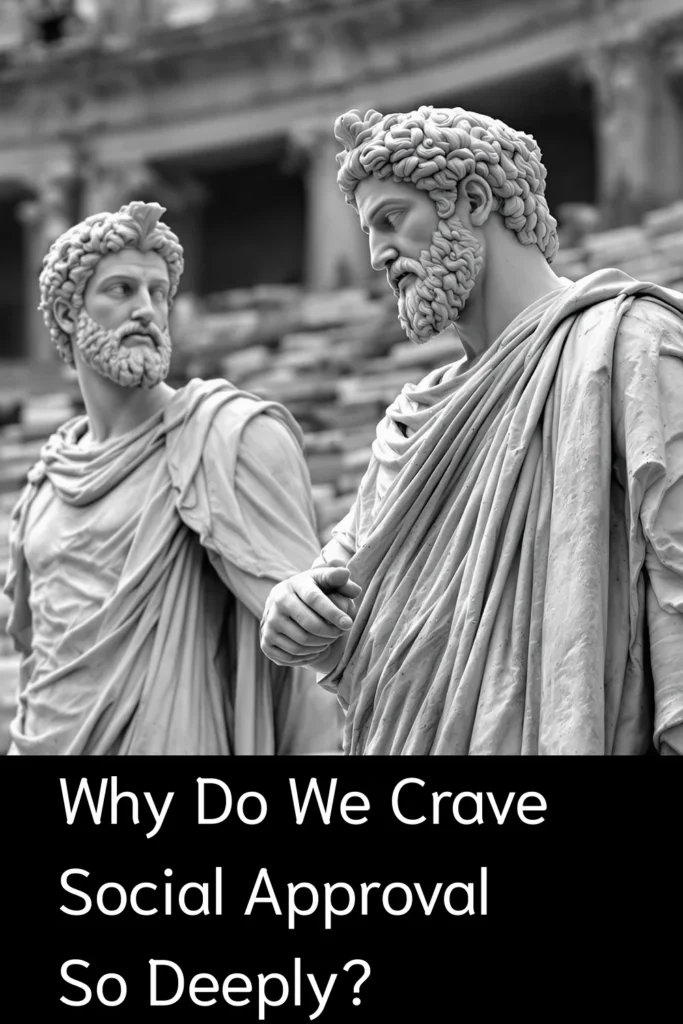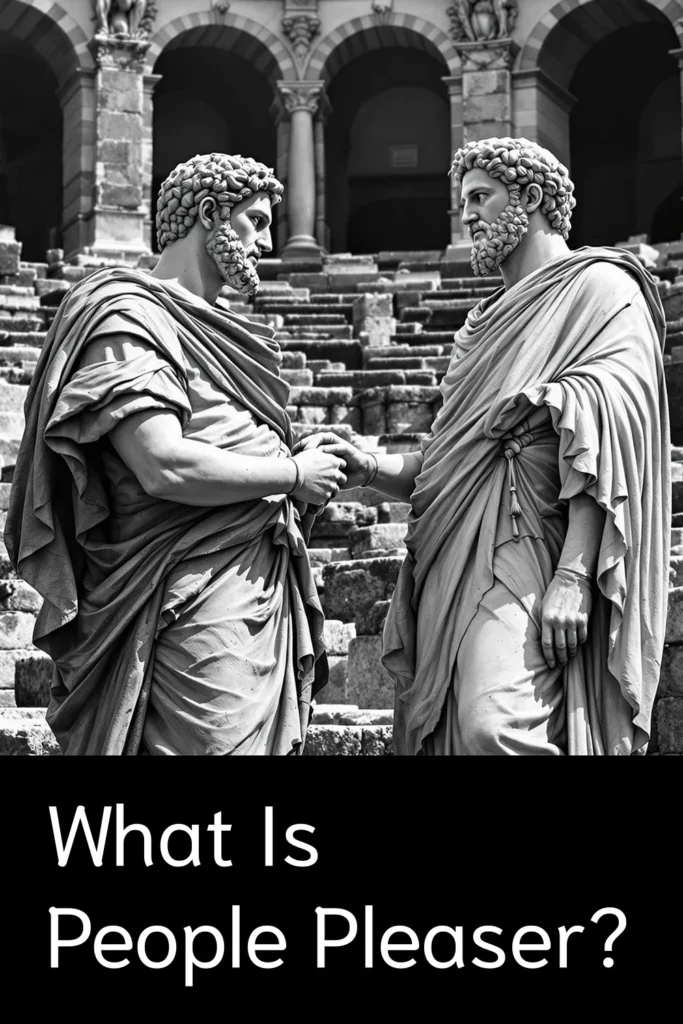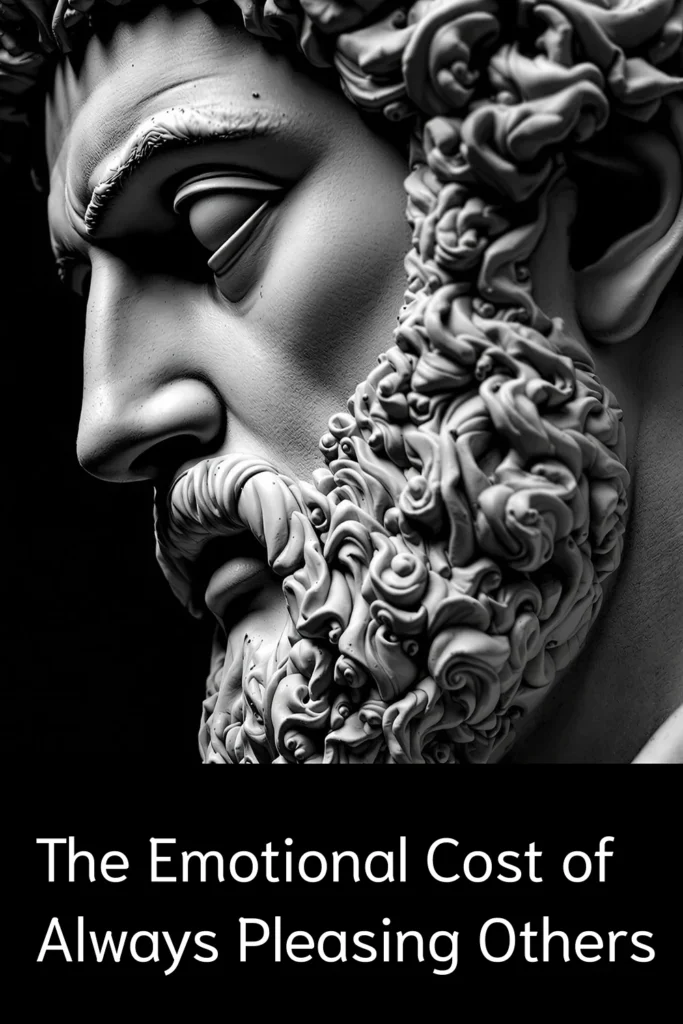Chasing social approval is a modern epidemic. From the chronic people pleaser to the person pleaser who can’t say no, many live to please people, at the cost of their peace. But Stoics knew better. To approve of yourself matters more than seeking approval from others. In this post, we’ll explore the indifferent meaning in Stoic philosophy, why always pleasing others leads to burnout, and how to remain calm by pleasing yourself instead.
What Does Chasing Approval Really Mean?
We all want to be accepted. It’s human. But when the need for approval becomes chronic, it quietly erodes our peace, our identity, and our freedom. The Stoics saw this for what it is: a dangerous emotional dependency disguised as social virtue.
To chase approval is to hand over your inner compass to someone else—and hope they steer you right. But spoiler alert: they won’t. Because most approvers aren’t thinking about you. They’re thinking about themselves.
And worse? What they approve of today, they might reject tomorrow. That’s why the illusion of approval is so toxic: it keeps you hooked on a moving target.

Why Do We Crave Social Approval So Deeply?
From childhood, we’re taught to seek approval for everything—from grades and clothes to tone of voice. We learn that love is earned. That praise means safety. That if others fail to approve, we’re doing something wrong.
This creates an internal blueprint: “I’ll be okay if they’re okay with me.”
But that’s a terrible deal.
Stoicism flips that script. It teaches you to be your evaluator—to base your life on principles, not applause.
“If you are pained by external things, it is not they that disturb you, but your own judgment of them.” – Marcus Aurelius
He’s pointing to the heart of it: social approval only has power if you give it power.
And if you’re honest, you’ll see the hunger to be liked is never really about them. It’s about your own fear of not being enough without their permission.
The Illusion of Approval & Why It Never Lasts
You work hard to be liked. You twist yourself into the version others want. You get the praise. You feel the high.
But then what?
You need it again. And again. Like a drug, social validation is fleeting. It doesn’t nourish—it spikes and crashes. And once you get used to performing for it, you’ll keep looking for new approvers to feed the addiction.
The Stoics would say: this isn’t virtue—it’s slavery.
“Freedom is the only worthy goal in life. It is won by disregarding things that lie beyond our control.” – Epictetus
And guess what’s outside your control? People’s opinions. Their moods. Their praise. Their approval.
Which means this: if your peace depends on approval, your peace is already gone.
How to Stop Chasing Acceptance & Start Pleasing Yourself
You don’t escape the approval trap by becoming bitter—you escape it by becoming so grounded in yourself that you no longer beg for permission to exist. That’s the Stoic way: live with virtue, not validation.
If you’ve always been pleasing others, chances are you’ve been neglecting the one person who actually matters—you. And that’s not humility. That’s self-abandonment.
This is where the shift begins: from chasing acceptance to choosing alignment. From sacrificing your peace to pleasing yourself without guilt.
Pleasing Yourself vs. Always Pleasing Others
Always pleasing others is just a socially acceptable form of fear.
When you live to be agreeable, to be liked, to keep the peace at all costs, you’re not being kind. You’re afraid.
Afraid to be disliked.
Afraid to disappoint.
Afraid to matter too much to yourself.
But pleasing yourself? That’s clarity. That’s choosing your well-being over others’ comfort. And no—it’s not selfish.
It’s the most responsible thing you can do.
If you’re constantly not taking care of yourself just to please others, you’re not giving them your best—you’re giving them what’s left.
And the Stoics would call that out. They didn’t live to be liked—they lived to be in alignment.
“He who lives in harmony with himself lives in harmony with the universe.”
– Marcus Aurelius
Recovering People Pleaser -> First Steps Toward Freedom
Becoming a recovering people pleaser isn’t about swinging to the other extreme. You’re not trying to become selfish or insensitive—you’re trying to become free.
Here’s how that starts:
Step 1: Catch the urge to “people please” in the moment.
That instant “yes” you blurt out? Pause next time. Notice it.Step 2: Ask, “Is this honest… or just easy?”
You’ll be shocked how often you say yes just to avoid tension.Step 3: Choose silence over performance.
Every time you stay grounded instead of rushing to fix others’ emotions, you build resilience.
This is how you learn how to remain calm—not by avoiding conflict, but by staying regulated when it shows up. That’s emotional maturity. That’s Stoicism in practice.
Being calm isn’t about being passive. It’s about being powerful without being reactive.
Why Do I Always Seek Approval From Others?
If you constantly second-guess your decisions, downplay your needs, or shape-shift just to avoid disapproval, you’re not broken—you’ve likely developed deep-rooted people pleaser tendencies.
This need to be liked isn’t a personality flaw. It’s a survival response built through years of emotional conditioning. The good news? Once you understand why you seek approval, you can stop being ruled by it and start living by self-respect over social reward.
The Anxious People Pleaser Mindset
You can spot the anxious people pleaser by one emotional pattern: fear.
Not loud, dramatic fear—but the quiet kind that whispers:
“If I upset them, they’ll leave.”
“If I say no, they’ll think I’m selfish.”
“If I’m not useful, I’m not lovable.”
This is the mindset of someone whose self-worth is outsourced to others. It’s not about kindness—it’s about control. You’re trying to manage how people see you, because deep down, you don’t trust they’ll stay if you show your true self.
But here’s the Stoic truth: No peace can come from living inside someone else’s opinion of you.
This mindset is what Stoics would call a distortion of nature.
You are not here to be agreeable. You are here to live by reason, principle, and truth.
And that starts with building emotional intelligence—the ability to feel your emotions without being dragged around by them.
Because the anxious people pleaser doesn’t lack empathy, they lack boundaries. And that’s not sensitivity. That’s self-abandonment.
The way out? Develop the social and emotional skills to stand your ground—even if your voice shakes.
Social and Emotional Development That Shapes Approval Addiction
Let’s go back to the beginning.
Approval addiction often forms in early life. If you were praised only when performing, if love felt conditional, or if you were taught to prioritize harmony over honesty, your brain wired itself for survival, not authenticity.
That’s not your fault. That’s a byproduct of disrupted social emotional development.
As kids, we’re all seeking connection. But if you had to trade authenticity for attachment, you learned that being real was dangerous—and being approved of was safe.
And unless you rewrite that script, your adult life becomes a loop:
Constant emotional development sabotage
Chronic second-guessing
A gnawing fear of being “too much” or “not enough”
To break the loop, you need to understand the emotional intelligence meaning the Stoics pointed to:
“If you want to improve, be content to be thought foolish and stupid.” – Epictetus
This line hits directly at the root of approval addiction: the fear of looking “wrong” or “unlikable.” Epictetus reminds us—if you’re serious about growth, you have to let go of needing praise. You have to stop performing and start being.
What Is a People Pleaser?
In a world that rewards agreeableness, it’s easy to confuse being nice with being virtuous. But Stoic philosophy doesn’t equate people-pleasing with kindness—it sees it as a failure of reason and a betrayal of the self.
The Stoics believed in justice, empathy, and integrity. But they also believed in truth over comfort, and virtue over popularity. A people pleaser, through the Stoic lens, is not noble—they’re misaligned. They live reactively, not rationally.
To live for the comfort of others is to live outside your nature.

Definition of a People Pleaser - More Than Just Being Nice
So, what’s the real people pleaser meaning?
To define people pleaser simply:
It’s someone who consistently puts others’ wants, needs, and expectations above their own—not out of love, but out of fear. Fear of conflict, rejection, or not being “enough.”
But the definition of a people pleaser runs deeper in Stoic thought.
It’s someone who:
Compromises the truth to avoid disapproval
Abandons reason to secure validation
Believes external peace is worth internal chaos
“If you are ever tempted to look for outside approval, realize that you have compromised your integrity.” – Marcus Aurelius (paraphrased)
That’s the Stoic verdict: A people pleaser is not at peace. He is at war with himself in silence.
He’s not choosing virtue—he’s choosing avoidance.
Examples of People Pleasing Behaviors in Daily Life
Here are common examples of people pleasing that don’t look dramatic, but slowly destroy your inner calm:
Saying “yes” when you mean “no”
Apologizing for having needs
Smiling to hide your frustration
Feeling guilty for resting
Constantly explaining yourself to avoid disapproval
Avoiding confrontation at all costs—even when you’re right
These are normalized forms of emotional self-erasure. And they all stem from the same distorted belief:
“If I keep them happy, I’ll finally be safe.”
This is the core of people pleasing behaviour—the desperate need to people please not from love, but from fear. And fear, as the Stoics taught, is never a rational guide for life.
The Stoic response? Cut the theatrics. Say what you mean. Do what aligns. Let them misunderstand you if they must. Because inner harmony > outer harmony—every time.
The Root Cause of Chronic People Pleasers
At first glance, being a people pleaser might look like empathy. But dig deeper, and you’ll find fear, guilt, and emotional enmeshment. The Stoics had no tolerance for this kind of disordered living. They called for self-mastery, not self-erasure.
To the Stoic, a chronic people pleaser isn’t just someone who’s “too nice”—they’re someone who’s deeply misaligned with nature. Why? Because they place emotions above reason, and others’ expectations above virtue.
When you feel responsible for everyone’s emotions, you’re not being noble.
You’re being controlled.
Why Chronic People Pleasers Feel Responsible for Everyone’s Emotions
If you’re a chronic people pleaser, chances are you walk into every room scanning for emotional tension—ready to fix it, absorb it, or silence yourself to avoid it.
This happens when you confuse emotional safety with emotional control.
You think: If I can just keep everyone happy, I’ll finally be okay.
But that’s not peace. That’s performance.
And it’s exhausting.
“No man is free who is not master of himself.” – Epictetus
Being a people pleaser means you’ve outsourced your emotional state to everyone else. If they’re upset, you feel guilty. If they’re disappointed, you feel like a failure. You’re so used to carrying other people’s moods that you can’t even find your own.
This isn’t empathy. It’s emotional slavery.
The Stoic solution? Detach from the illusion that others’ emotions are your responsibility. You are responsible for your actions, not their reactions.
That’s the boundary that sets you free.
The Pathological People Pleaser Pattern: Approval as Survival
There’s a deeper level to this dynamic—one where approval isn’t just nice to have… It’s life or death. That’s the mindset of the pathological people pleaser.
This isn’t just about being polite or agreeable.
This is about survival wiring.
As a pathological people pleaser, you learned early on:
Love had to be earned
Affection came with conditions
Anger or rejection meant danger
So you adapted. You smiled when you wanted to scream. You agreed when your gut said no. You became what others needed so they wouldn’t leave, blow up, or withdraw.
Now? It’s automatic. It’s your identity.
But the Stoics saw this for what it is: a life governed by externals.
And that, they would say, is the definition of slavery.
“It never ceases to amaze me: we all love ourselves more than other people, but care more about their opinion than our own.”
— Marcus Aurelius, Meditations, Book 12, Section 4
Freedom comes when you stop tying your worth to someone else’s approval.
Let them disapprove. Let them misunderstand.
Your peace doesn’t need their permission.
That’s the exit path from the people pleaser tendencies that have ruled your life for too long.
What Kind of Childhood Creates a People Pleaser?
No one is born a people pleaser. You become one. Slowly. Quietly. Over the years of emotional training disguised as “being good.”
From a Stoic perspective, this training is a distortion of nature. You’re not meant to live at the mercy of others’ emotions. You’re meant to live by reason, by principle, and by inner strength. But many children never learn that strength—because their earliest environment teaches them to survive, not to thrive.
Early Emotional Conditioning and the Need to Please
Much of emotional development in early childhood depends on one thing: safety. If a child feels unconditionally loved and secure, they’re free to express emotions, set boundaries, and grow into someone anchored in themselves.
But for the child who senses love is conditional—based on performance, obedience, or silence—survival means suppression.
This child quickly learns:
Anger gets punished
Sadness gets ignored
Needs are “too much”
Approval = safety
Disapproval = threat
So what do they do?
They smile when they’re scared. They say “yes” when they mean “no.” They become hyper-aware of everyone else’s emotional state. They adopt early people pleasing behaviors not as kindness, but as a defense.
Stoicism teaches us that our reactions shape our suffering. But for many, those reactions were programmed before they even had a choice.
This early conditioning sets the stage for a life of second-guessing, self-betrayal, and emotional exhaustion. And until you recognize the pattern, you’ll keep reenacting it in every adult relationship, quietly begging for the approval you never truly received.
Role Reversal and Survival
When a child is forced to emotionally care for the parent—or “keep the peace” in the home—their social development in early childhood becomes inverted. This is called role reversal. And it’s one of the clearest origins of the person pleaser identity.
Instead of being nurtured, the child becomes the emotional caretaker.
Instead of being protected, they become the peacekeeper.
And instead of being free to explore who they are, they become who everyone else needs them to be.
They grow up believing:
“It’s my job to fix everyone.”
“I can’t have needs if someone else is upset.”
“Being useful is how I stay safe.”
The result? A full-grown adult who’s confident on the outside but codependent on the inside.
Their worth is still tied to usefulness. Their peace still depends on others being okay.
“Don’t give circumstances the power to rouse anger, for they don’t care.” – Marcus Aurelius
That’s the truth a recovering person pleaser must learn: the world doesn’t owe you safety, and your identity isn’t built on how well you manage others.
Your job now isn’t to keep the peace—it’s to make peace with yourself.
The Hidden Danger of Being a People Pleaser
On the surface, being agreeable looks harmless—admirable, even. But the danger of being a people pleaser isn’t just that you say “yes” too much. It’s that, over time, you disappear.
Stoicism doesn’t praise passivity. It praises virtue, autonomy, and emotional intelligence. And the moment your need to please others overrides your ability to live by principle, you’re no longer free. You’re a puppet pulled by approval.

The Emotional Cost of Always Pleasing Others
If you’re always pleasing others, here’s what you’re doing:
You’re saying yes when you mean no.
You’re suppressing your truth to avoid discomfort.
You’re prioritizing their calm over your clarity.
And here’s the price: emotional fatigue.
It’s not obvious at first. You might even get praised for being “so reliable” or “so easy to work with.” But inside, something is eroding. You feel drained. Overstimulated. Resentful. You go home smiling on the outside and hollow on the inside.
“If you are distressed by anything external, the pain is not due to the thing itself but to your estimate of it.” – Marcus Aurelius
This is where emotional intelligence comes in. Not the performative kind—real emotional intelligence. The kind that says:
I can care without caretaking.
I can be kind without betraying myself.
I can disappoint someone and still be a good person.
Because self-betrayal for the sake of approval is not emotional maturity.
It’s emotional burnout dressed up as politeness.
People Pleasing as Self-Abandonment - The Slow Burn
People pleasing isn’t compassion. It’s self-abandonment.
It’s a habit. A reflex. A programmed behavior that says:
“If they’re okay, then I’m okay.”
But here’s what Stoic philosophy teaches: your peace does not come from others being okay. It comes from you living in alignment with truth, reason, and virtue, not from avoiding discomfort or rejection.
Every time you put someone else’s comfort above your own clarity, you chip away at your self-respect.
Every time you suppress your real thoughts to keep the room calm, you teach yourself that your truth is too loud.
Every time you delay rest, silence your needs, or agree just to “keep the peace,” you’re not taking care of yourself.
These are not harmless habits. These are people pleasing behaviours that, over time, become identity. And that identity starts to rot from the inside.
“It is not the man who has too little, but the man who craves more, that is poor.” – Seneca
Approval is a craving. People pleasing is an addiction. And like any addiction, it will drain you before it ever fulfills you.
People Pleaser Personality Traits
The people pleaser personality isn’t about kindness—it’s about compulsion. It’s not generosity, it’s fear wearing a polite smile. And from a Stoic lens, it’s the mark of someone whose internal world is dictated by external forces.
In Stoicism, character is defined not by how much you’re liked, but by how consistently you live in alignment with virtue. The people pleaser, however, trades virtue for validation. They fear disapproval more than they fear dishonesty.
The Stoics would say: This is not strength—it’s slavery.
Top Signs of a Chronic People Pleaser
You might be walking around with a confident exterior, but if any of these people pleaser tendencies apply, it’s time for a wake-up call:
You agree—even when you don’t.
You apologize for things that aren’t your fault.
You avoid conflict like it’s the plague.
You feel guilty for resting.
You replay conversations in your head, wondering if you said “too much.”
You obsess over tone in your texts, afraid of being misunderstood.
These are not quirks. These are survival strategies. And while they may have worked once, they’re now limiting your ability to live freely.
Here’s a powerful people pleaser example:
Someone invites you to a gathering you don’t want to attend. Your gut says no, but your mouth says, “Sure, sounds great!”
Why? Because disappointing others feels more dangerous than dishonoring yourself.
“It is not things themselves that disturb us, but our opinions about them.” – Epictetus
Your fear of being disliked is an opinion. Not a truth.
And it must be challenged—if you want to be free.
People Pleasers and Relationships
The people pleaser in relationship doesn’t just lose themselves—they lose intimacy. Why? Because when you’re always agreeable, always accommodating, always “easygoing,” your partner isn’t connecting with you. They’re connecting with your mask.
You can’t build a real relationship if you’re terrified of disappointing someone.
True connection requires boundaries. Truth. Discomfort. Sometimes, even conflict.
And the people pleasers and relationships dynamic avoid all of it.
But avoidance has a cost:
You’ll feel unseen.
Resentment will build.
You’ll become emotionally exhausted—and silently hope they notice.
Spoiler: they won’t. Because you’ve trained them not to.
Stoicism would tell you: if you have to trade your voice for love, it’s not love—it’s dependency.
“The soul becomes dyed with the color of its thoughts.”
— Marcus Aurelius, Meditations, Book 5, Section 16
So if you’re in a relationship and you feel like you’re constantly managing their emotions, anticipating their reactions, or muting your own truth—pause.
Ask yourself: Is this connection or control?
People pleasing might keep the relationship together, but it slowly destroys the person inside it.
Why Some People Can’t Say No?
Saying “no” shouldn’t be hard. It’s a two-letter word. But for many, it feels like betrayal. Rejection. Guilt. This is the hidden cost of approval addiction: you lose your ability to set boundaries without an emotional storm.
The Stoics would call this a form of self-enslavement. Why? Because if you can’t say “no,” you aren’t free—you’re agreeable by compulsion, not by choice.
The Emotional Fear Behind Saying “No”
The difficulty saying no isn’t about the word itself. It’s about what follows:
The fear of being disliked
The discomfort of disappointing someone
The panic that you’ll lose your value if you’re not useful
These are the core people pleaser tendencies—always keeping the peace, even when it costs your peace.
But here’s what the Stoics teach:
A man who lives for approval is never in control of his own life.
“No man can live a happy life, or even a supportable life, without the pursuit of wisdom, truth, and virtue; he must be free from fear and desire.”
— Seneca, Moral Letters to Lucilius, Letter 16, “On Philosophy, the Guide of Life”
Refusing to say “no” is often an emotional reflex—a survival strategy taught in childhood, reinforced by culture, and left unchallenged by adulthood.
But if you can’t say “no” when it matters… your “yes” is worthless.
How Social Skills and Boundaries Work Together
Strong social skills aren’t about being liked—they’re about being authentic without apology.
You can have rock-solid people skills, be calm, respectful, and kind, and still be firm with your boundaries. Social abilities that lack boundaries aren’t skills at all. They’re just emotional gymnastics.
The Stoic doesn’t seek to avoid discomfort. He seeks to act by reason, regardless of outcome. And that’s what saying “no” is about: acting with clarity, not fear.
“Don’t explain your philosophy. Embody it.” – Epictetus
Every time you set a boundary calmly, you demonstrate emotional control. Every time you say “no” without guilt, you live by principle, not pressure.
So if you struggle with difficulty saying no, stop viewing it as a weakness of kindness. Start seeing it as a sign of undeveloped boundaries and misplaced fear. Then fix it.
Because people who respect themselves don’t hesitate to protect their time, their energy, and their peace.
What Does It Mean to Be Indifferent? (Stoic Definition)
The word “indifferent” gets a bad reputation. It sounds cold. Detached. Apathetic. But from a Stoic perspective, indifference isn’t emotional numbness—it’s emotional mastery.
To the Stoics, being indifferent doesn’t mean you don’t care. It means you’re not controlled by things outside your power.
It’s not about a lack of concern for others—it’s about right concern. You don’t waste energy trying to bend external events to your will. You use your energy to govern your character, not the chaos around you.
“Some things are up to us, and some are not.” – Epictetus
This is the core of Stoic indifference: if it’s not in your control, it doesn’t deserve your stress.
The Indifferent Meaning in Stoicism Explained
In Stoic thought, the indifferent meaning is technical. The world is full of “indifferents”—things that are not inherently good or bad. Fame. Failure. Money. Loss. Praise. Rejection.
Being indifferent means you don’t assign value to these externals. You don’t let them define your worth or disturb your peace.
Someone insults you? Not yours to control.
You didn’t get the job? Not yours to force.
They don’t approve? Not yours to chase.
Does this mean you stop trying? No. It means you stop attaching.
You act with reason, let go of outcome, and accept what follows with grace.
This is not detachment from life. It’s detachment from illusion.
A Person Who Doesn’t Care About Anything? Or Just Calm?
To outsiders, a Stoic might look like a person who doesn’t care about anything. But that’s a surface-level misunderstanding.
The truth? Stoics care deeply. They just don’t panic.
They don’t beg for control over what isn’t theirs. And they never trade calm for chaos.
This ability to remain calm, even when insulted, dismissed, or ignored, isn’t passive. It’s trained. It’s earned. And it’s what makes Stoic indifference so powerful.
Think about it:
You’re in a heated argument.
You feel the anger rising.
But instead of reacting, you breathe. You remain calm.
Not because you don’t care, but because you care about your peace more than the drama.
That’s the kind of man Stoicism builds.
Not cold. Not cruel. Just… composed.
And in a world addicted to outrage? That’s rare. That’s a strength.
What Is Indifference in a Relationship?
In love, people assume being indifferent in a relationship means being distant, heartless, or emotionally shut off. But through a Stoic lens, indifference doesn’t mean coldness—it means clarity.
It means holding firm to your values, even when emotions run high. It means loving someone without losing yourself in the process.
“You must build your life action by action, and be content if each one achieves its goal as far as possible.” — Marcus Aurelius
The Stoic does not love with obsession. He does not depend on his partner’s mood to feel whole. He loves with presence, with virtue, and with boundaries, not with desperation.
The Difference Between Coldness and Clarity
There’s a huge difference between apathy and emotional intelligence.
Being indifferent in a relationship doesn’t mean you stop caring—it means you stop over-functioning.
The emotionally intelligent Stoic can:
Listen without defending
Love without losing himself
Set boundaries without guilt
Walk away without emotional collapse
This isn’t cruelty. It’s clarity.
When you’re emotionally clear, you no longer try to fix, control, or rescue your partner. You respect their autonomy—and your own. You stay calm when tension rises. You don’t panic when misunderstood. You remain rooted in truth, not turmoil.
That’s being indifferent in a relationship: calm in chaos, firm in values, centered in love, not approval.
“A Stoic is never indifferent to duty, only to outcome.” — Stoic principle
People Pleasers and Romantic Relationships -> A Toxic Loop
Now contrast that with the people pleaser in relationship—someone who tries to love by sacrificing themselves.
Their love is full of people pleasing behaviors:
Agreeing just to avoid conflict
Saying yes when they mean no
Taking the blame to “keep the peace”
Disregarding personal needs to make the other feel secure
Tolerating disrespect to avoid rejection
These aren’t acts of love—they’re acts of emotional self-erasure.
The people pleaser in relationship slowly becomes invisible, hoping that being easy to love will make them impossible to leave.
But here’s the paradox: the more you abandon yourself, the more the relationship deteriorates. Because love without authenticity is just performance.
And the Stoics didn’t perform. They lived truthfully.
To escape the toxic loop, one must move from people pleasing behaviors to principled behavior—from reaction to reason.
Set emotional boundaries. Speak your truth. Be kind, but never dishonest.
That’s Stoic love. It’s not about how much you give—it’s about how true you stay to yourself while giving.
What Does Indifference Emotionally Really Mean?
When people hear “indifference,” they often imagine numbness, like someone emotionally shut down or just too cold to care. But in Stoic philosophy, indifference emotions aren’t about suppressing feeling—they’re about mastering them.
The Stoic doesn’t fear emotion. He simply refuses to be owned by it.
He sees anger, sadness, fear, and doesn’t let them drag him.
He feels—but doesn’t cling. He cares—but doesn’t crumble.
That’s the emotional intelligence Stoicism teaches:
Not detachment from life, but detachment from turmoil.
Stoic Emotional Intelligence
Emotions are natural. But emotional chaos? That’s a choice.
The Stoics knew this and trained for it daily.
To them, emotional intelligence was not about being unbothered—it was about being unbreakable. They cultivated self-awareness, self-control, and clear perception. They knew when to feel—and when to step back.
“You don’t have to turn this into something. It doesn’t have to upset you.” — Marcus Aurelius
So what do indifference emotions look like?
It’s the calm during someone else’s storm.
It’s the stillness in chaos.
It’s feeling frustration rise, and letting it pass without acting on it.
In modern terms, this is high-level emotional intelligence.
In Stoic terms? It’s freedom.
Because if you react to everything, you control nothing. But if you master your reactions, you master your life.
How to Remain Calm in Stressful Situations Without Shutting Down
Modern life is loud. Deadlines. Arguments. Expectations. Opinions.
And it’s tempting to either blow up or shut down.
But the Stoic finds a third option: calm presence.
Here’s how Stoics trained themselves to remain calm under pressure:
Pause the internal story.
– Instead of reacting, they observe.
– “Is this in my control?” If not, drop it.Return to the breath.
– Even Marcus Aurelius reminded himself: the breath is the anchor.
– One deep inhale = one foot back from panic.Zoom out.
– Epictetus taught that perspective is power.
– Will this matter in a week? A year? A lifetime?Act, don’t react.
– They didn’t avoid pressure. They practiced rising above it.
– Remain calm in stressful situations—not by shutting down, but by stepping up with discipline.
Joy without external validation. Calm without external order. That’s the goal.
Remaining calm under pressure isn’t passive. It’s a skill. A trained response. A signal that your emotional life serves your values, not the other way around.
And that’s the real emotional superpower Stoicism offers.
Final Reflections
At its core, Stoicism teaches us that the only thing truly within our control is our mind and actions. The real power of indifference lies in this understanding—that external approval is fleeting and unreliable. The Stoic principles remind us to cultivate emotional intelligence, mastering our reactions rather than chasing the approval of others.
When you let go of the need for external validation, you free yourself from a lifetime of anxiety and dependency. You no longer live to please others, but to please yourself—and that shift is transformational.
Because seeking approval is chasing shadows; indifference is owning your light.
Why “Being Indifferent” Isn’t Cold
Many mistake being indifferent for apathy or coldness. But the Stoics taught that true indifference means calm clarity, not emotional numbness. It’s about discerning what matters and what doesn’t, and cultivating the strength to remain calm under pressure.
This indifferent meaning is about aligning with nature and reason, not reacting to every external disturbance. It’s choosing peace over chaos, purpose over distraction. This kind of calm is a conscious choice, a practiced discipline, not a lack of care.
Stop Waiting to Be Approved
If you’re tired of living to please everyone else, it’s time to flip the script. Stop waiting for approval from the outside world. Start approving of yourself—the real you. Practice pleasing yourself through authenticity, integrity, and self-care.
Remember: self care is not selfish. It’s essential for true freedom and resilience. When you honor yourself, you build an unshakable foundation that no external opinion can topple.
The Stoics knew this truth centuries ago.
It’s time you live it today.





